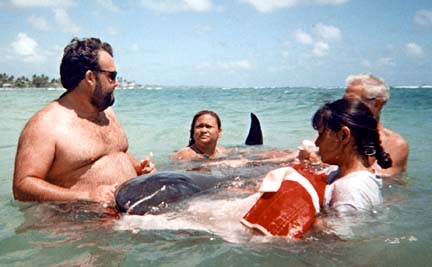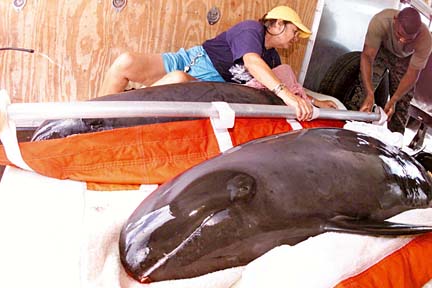
PHOTO COURTESY OF MADELEINE AKINA
Brad Ryon, left, of the National Marine Fisheries Service, got help yesterday from dozens of other volunteers trying to support two melon-headed whales at Hauula Beach Park. Members of the Hawaiian Islands Stranding Response Group and Marines transported the adult male whales in vans to a holding tank at Marine Corps Base Hawaii in Kaneohe.
Volunteers in Hauula
aid 2 beached whalesThe stricken animals were
transported to Kaneohe Marine base
Campers, beach-goers and passers-by at Hauula Beach Park helped support two melon-headed whales in the water for more than four hours after they beached themselves yesterday morning.
To help sea animals
If you see a marine animal in distress, call the National Marine Fisheries Service's 24-hour emergency line at (888) 256-9840. The mainland-staffed hot line dispatches local response teams for the Hawaiian Islands.
The volunteer Hawaiian Islands Stranding Response Group and U.S. Marines removed the two adult male whales from the ocean by 1 p.m. The apparently ailing animals were transported by van to a holding tank at the Marine Base Hawaii at Kaneohe, where they were being treated and observed.
The Kamauu siblings -- 10-year-old Lauren, 6-year-old Ginger and 8-year-old George, who were camping on the beach -- said they were the first to see the whales, about 7 a.m.
"One was stuck on the top of big rocks and one was on top of the sand," Lauren said.
Sherri Pahulu said she was driving toward her Hauula home after taking her kids to school when she saw a whale stuck on the reef about 8:30 a.m.
Pahulu pulled over and got in the water to help keep one of the 7-foot-long whales afloat in chest-deep water. The other was a little down the coast, she said.
"I stayed until the guys came with stretcher," Pahulu said. "It took them forever."
Naoko Forderer, who also helped, said the whales didn't seem to have the strength to head back out to deep water. "I think they were really sick," she said.
"The unfortunate reality is there's a reason those two were on the beach" and that illness or weakness could mean they can't be saved, said Marlee Breese, Hawaiian Islands Stranding Response Group vice president.
Melon-headed whales are common around the Hawaiian Islands, but typically travel in large pods in deep water miles from land, Breese said.
Though some who helped the whales wondered why it took all morning for rescuers to get there, Breese called the response time "fast."
She credited the Marine escort with lights and sirens for moving the rescue quickly between the Marine base and Hauula.
Madeleine Akina, who helped with the whales between 9 and 11:30 a.m., credited whoever first pulled the animals away from shore with saving their lives. She called caring for the whales "a once-in-a-lifetime experience."
PHOTO COURTESY MARINE CORPS SGT. JOSEPH A. LEE
Marlee Breese, animal care specialist with the University of Hawaii's Marine Mammal Research Program, helped Cpl. Steven Sparks, motor transport operator with Base Motors at Marine Base Hawaii at Kaneohe, prepare the whales to be put into a holding tank at the base yesterday.
The two whales weigh 385 and 360 pounds and are in pretty good shape externally, except for some cuts from coral, said Bob Braun, veterinarian and president of the volunteer response group, which responds to stranded animals statewide.
Blood drawn from the whales will be analyzed today for infectious diseases or organ failure, Braun said. In the meantime, they will be rehydrated, fed and given antibiotic injections, he said.
"I'm standing in the water with a whale," Braun said last night by cell phone from a tank at Marine Base Hawaii, where he expected to be all night. "I just put a squid in the mouth of one that's trying to decide whether he's going to eat it or not."
Pahulu said yesterday evening: "We hope they make it. We felt bad for them."
Lauren Kamauu said, "All they need is some bandages and to stay at the base a little while till they grow stronger."
The last stranded sea mammals helped by the response group were a striped dolphin and pygmy sperm whale on Maui about six weeks ago.

